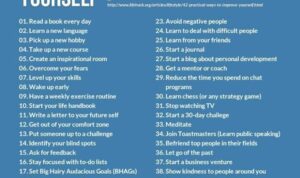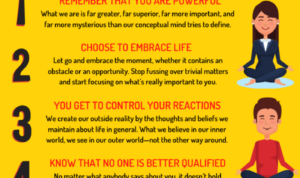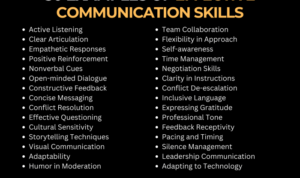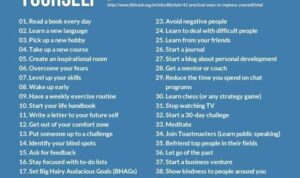Effective Communication Skills are essential tools that can transform personal and professional relationships, paving the way for success and growth. Dive into the world of communication mastery with us as we explore the key elements and strategies for enhancing your communication prowess.
From deciphering the nuances of verbal and non-verbal cues to navigating through common barriers, this journey will equip you with the skills needed to communicate effectively in any situation.
Importance of Effective Communication Skills
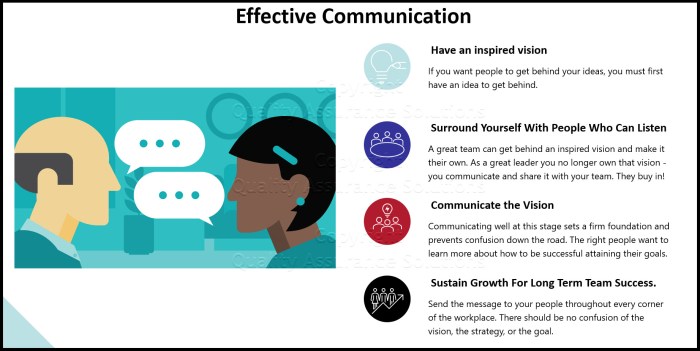
Effective communication skills are essential in both personal and professional settings. In personal relationships, good communication can help build trust, resolve conflicts, and strengthen connections with others. For example, being able to express your thoughts and feelings clearly can prevent misunderstandings and improve the overall quality of your relationships.
In a professional setting, strong communication skills are crucial for success. Clear and effective communication can enhance teamwork, increase productivity, and boost morale among colleagues. For instance, a leader who can clearly articulate goals and expectations is more likely to inspire and motivate their team to achieve success.
Conversely, poor communication skills can lead to a host of problems in various aspects of life. In personal relationships, misunderstandings caused by ineffective communication can strain bonds and lead to resentment. In the workplace, miscommunication can result in errors, delays in projects, and even conflicts between coworkers. Overall, the consequences of poor communication skills can be detrimental to both personal and professional well-being.
Key Elements of Effective Communication: Effective Communication Skills
Effective communication involves several key components that are essential for successful interactions. Verbal and non-verbal communication play crucial roles in conveying messages accurately and building strong relationships. Active listening is another vital element that ensures understanding and promotes effective communication.
Verbal and Non-Verbal Communication
Verbal communication involves the use of words to convey messages, while non-verbal communication includes gestures, facial expressions, body language, and tone of voice. Both forms of communication work together to provide a complete picture of the message being communicated. Verbal communication is important for clarity and precision, while non-verbal cues can enhance or contradict the verbal message. For example, saying “I’m fine” with a smile may convey a different message than saying the same words with a frown.
Active Listening
Active listening is a crucial component of effective communication that involves fully concentrating on what is being said, understanding the message, responding appropriately, and remembering the information. It requires focus, attention, and empathy to ensure that the speaker feels heard and understood. Examples of active listening include maintaining eye contact, nodding in agreement, paraphrasing the speaker’s words, and asking clarifying questions. Active listening helps to build trust, resolve conflicts, and strengthen relationships.
Developing Effective Communication Skills
Effective communication skills are essential in various aspects of life, including personal relationships, professional settings, and social interactions. Developing these skills can significantly improve the quality of communication and lead to better understanding between individuals.
Strategies for Improving Communication Skills in Daily Interactions
- Practice active listening by giving your full attention to the speaker and showing genuine interest in what they have to say.
- Be mindful of non-verbal cues such as body language, facial expressions, and tone of voice to better understand the message being conveyed.
- Ask clarifying questions to ensure you have understood the message correctly and avoid misunderstandings.
- Practice empathy by putting yourself in the other person’s shoes and trying to understand their perspective.
- Seek feedback from others on your communication style and be open to constructive criticism for improvement.
Share Tips on How to Enhance Clarity and Articulation in Communication
- Avoid using jargon or technical language that may not be understood by all parties involved.
- Organize your thoughts before speaking to ensure a clear and coherent message.
- Use simple and concise language to convey your ideas effectively.
- Practice speaking slowly and enunciating words clearly to improve articulation.
- Use visual aids or examples to help clarify complex ideas and make them more understandable.
Discuss the Importance of Empathy and Emotional Intelligence in Effective Communication, Effective Communication Skills
- Empathy allows individuals to connect on a deeper level and understand the emotions and feelings of others.
- Emotional intelligence helps in managing emotions effectively and responding appropriately in different communication scenarios.
- By being empathetic and emotionally intelligent, individuals can build trust, strengthen relationships, and resolve conflicts more effectively.
- Practicing empathy and emotional intelligence can lead to more meaningful and impactful communication interactions.
Overcoming Communication Barriers
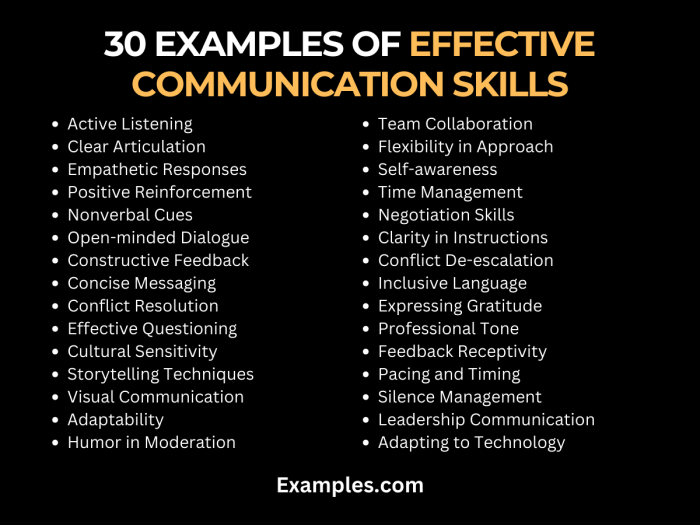
Effective communication can be hindered by various barriers that may arise in different situations. It is essential to identify these barriers and learn how to overcome them in order to communicate more efficiently.
Identifying Common Barriers
- Physical Barriers: Such as noise, poor lighting, or even distance, can disrupt communication. To overcome this, ensure a suitable environment for communication.
- Emotional Barriers: Personal emotions like anger, fear, or stress can impact communication. Acknowledge these emotions and try to address them before engaging in a conversation.
- Cultural Barriers: Differences in cultural backgrounds, beliefs, and values can lead to misunderstandings. Respect and learn about other cultures to bridge these gaps.
Dealing with Conflicts
- Active Listening: Listen attentively to the other person’s perspective without interrupting. This can help in understanding their point of view and resolving conflicts effectively.
- Clarification: If there is a misunderstanding, ask for clarification to ensure both parties are on the same page and avoid conflicts due to miscommunication.
- Empathy: Put yourself in the other person’s shoes to understand their feelings and thoughts, which can help in resolving conflicts peacefully.
Bridging Cultural Differences
- Respect Diversity: Acknowledge and appreciate cultural differences, as they enrich communication and bring new perspectives to the table.
- Education: Educate yourself about different cultures, traditions, and customs to avoid misunderstandings and promote effective cross-cultural communication.
- Open-mindedness: Approach conversations with an open mind and willingness to learn from others, regardless of their cultural background.







